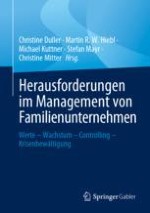2023 | OriginalPaper | Buchkapitel
Künstliche Intelligenz in Familienunternehmen
verfasst von : Alessia Patuelli, Ksenia Keplinger
Erschienen in: Herausforderungen im Management von Familienunternehmen
Verlag: Springer Fachmedien Wiesbaden
Aktivieren Sie unsere intelligente Suche, um passende Fachinhalte oder Patente zu finden.
Wählen Sie Textabschnitte aus um mit Künstlicher Intelligenz passenden Patente zu finden. powered by
Markieren Sie Textabschnitte, um KI-gestützt weitere passende Inhalte zu finden. powered by
